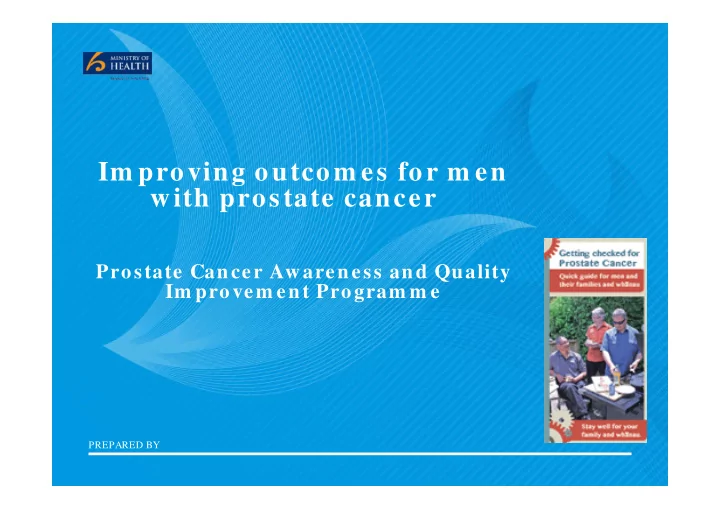

Im proving outcom es for m en with prostate cancer Prostate Cancer Awareness and Quality Im provem ent Program m e PREPARED BY
Awareness and Quality Improvement Programme • Published by the Ministry May 2013 • Based on the recommendations of the Prostate Cancer Taskforce • Four year programme that will: • increase awareness • improve the quality of care across the cancer pathway • reduce harms caused by over treatment • enable better outcomes • Accountability is held by the Ministry, support and oversight for programme implementation provided by the working group.
Programme structure Greater access to information – informed decisions, consistent support, appropriate formats Care along the cancer pathway – consistent and appropriate referral to specialist care, accurate diagnosis and staging, shorter wait times, consistent treatment and higher quality care Monitoring, research and evaluation – continuous improvement June 2015/6 2014/5 2013/4 2017
Working Group Membership Professor John Nacey – Chair Professor Brett Delahunt – Pathology Professor Ross Lawrenson – Public Health/primary care Rosemary Minto – Primary care nursing Trevor Lloyd – DHB (planning and funding) Dr Stephen Mark – Urology Mark von Dadelszen – Consumer/NGO Jacob Te Kurapa – M ā ori practitioner Dr Tim Malloy – General Practice.
Greater access to information • Make information on the early diagnosis and treatment of cancer available: • suitable formats • languages • distribute from a range of locations • Decision support tool to assist men and GPs in shared decision making about early detection and treatment • Develop information on the benefits and risks of prostate cancer tests and treatment options • Implement a prompt in GP patient management systems - identify men who should be offered information & track against agreed care plans • Provide consistent information for national telephone advice services • Include content on prostate cancer in training and education for GP and health care providers.
Care along the cancer pathway • Referral guidelines & guidance for managing advanced cancer • Incorporate prostate cancer referral guidelines into e-referral process • Standards, indicators & guidelines for staging investigations • Support pathologists’ professional development through education and audit programmes • National standards and key indicators • Monitor diagnosis and treatment times • Guidelines active surveillance and treatment • Improve access to multidisciplinary advice.
Monitoring, evaluation and research • Monitor and evaluate the progress and impact of changes • Develop systems for improved data collection, reporting and analysis • Implement structured reporting for prostate cancer biopsies and prostatectomy specimens • Implement indicators to enable monitoring across the pathway • Undertake research to support continuous improvement.
AQIP priorities Priority activities for the first two years are to: • Establish and support the Prostate Cancer Working Group • Develop and distribute information • Develop a decision support tool • Develop national standards and key indicators • Develop guidelines – active surveillance, advanced and metastatic & appropriate referral to specialist care • Establish a monitoring and evaluation programme • Implement monitoring of diagnosis and treatment times • Examine areas to support continuous service improvement.
Recommend
More recommend